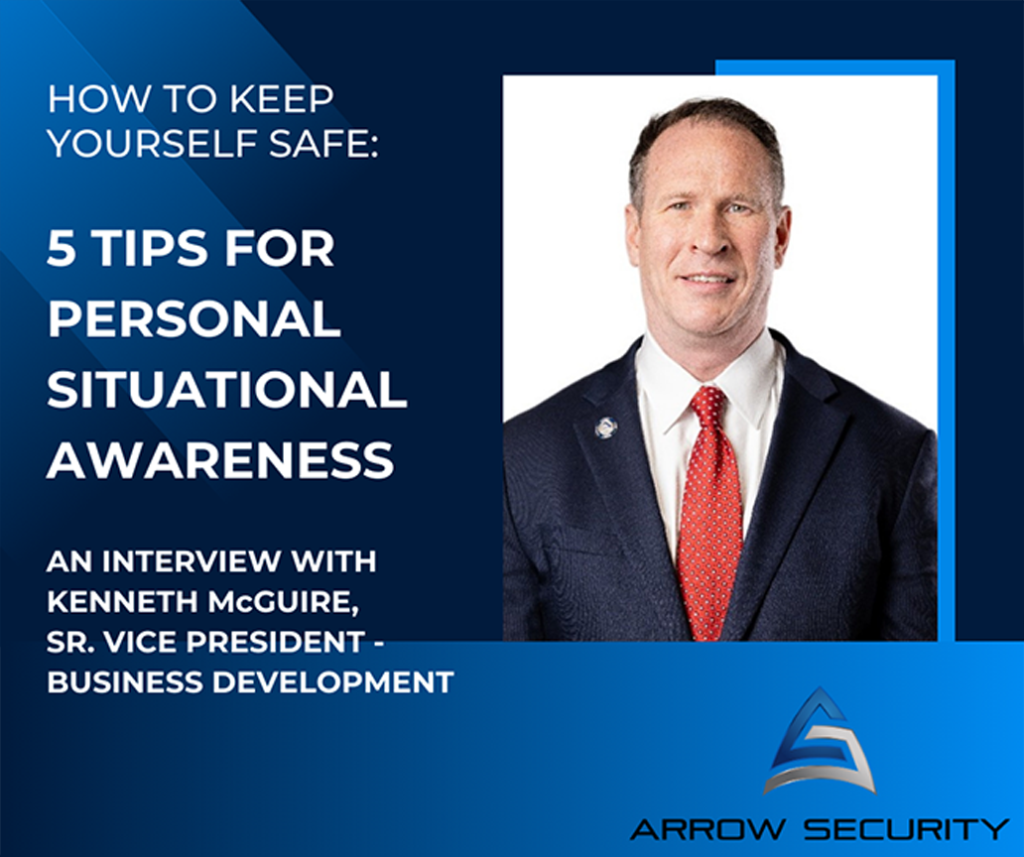
The definition of personal situational awareness is being aware of one’s surroundings and any potential hazards or threats. Sounds simple enough, but how do you practice this in your everyday life? How do you ensure that you are being cautious and continually aware of your surroundings?
We recently sat down with Kenneth McGuire, Senior Vice President of Business Development at Arrow Security, to discuss some key points regarding personal safety. Mr. McGuire has nearly 20 years of experience in the security industry, as well as being a highly decorated retired New Jersey Police Detective.
“You must be proactive in your approach to personal safety. You wouldn’t go to bed at night without locking your doors or setting your security alarm to ensure that your home and perimeter are safe,” says McGuire. “You should also have that same mindset when you’re out walking, shopping, or commuting to work. It starts with being prepared at all times.”
Here are his suggested tips for enhancing and elevating your personal situational awareness:
- Stay Alert
Always pay attention to your surroundings. Regularly scan your environment. Keep your focus and avoid distractions. Use your phone or other devices responsibly to enhance, not hinder, your awareness. Be cautious about over-reliance on technology, especially in unfamiliar areas. Don’t let your guard down.
“How can you react if you’re just looking at your phone? You have no idea of what is going on around you. Take note if anyone is behaving oddly, seems aggressive or nervous,” says McGuire. “Be observant and aware of your surroundings at all times. Technology can be a detriment if you’re focused on your phone and not your situation.” However, McGuire notes, sometimes a phone can be helpful if it allows you to record a problem situation – but only attempt this if it is safe to do so.
- Trust Your Intuition
Observe the behaviors of people around you. Look for signs of discomfort, aggression, or unusual actions. Trust your instincts; if something doesn’t feel right, it probably isn’t. If something feels off, trust your gut, and take appropriate action.
“If you encounter someone who makes you feel uneasy or is acting aggressively, put as much space as possible between you and them and alert a police officer or security guard. Security guards patrol most shopping malls and individual businesses can assist. If you see something, say something – just like the slogan,” explains McGuire.
- Stay Informed and Educate Yourself
Be aware of current events and local news and understand potential risks and threats in your community, as well as unfamiliar areas you plan to visit. Become educated through accredited and professional services in self-defense techniques, personal safety measures, and basic first aid.
“You may want to consider learning how to defend yourself. There is an array of self-defense classes out there. You can search online, check with your local library, or the adult education program in your area,” says McGuire. “And remember, if it’s an emergency and feel you are being threatened, call 911.”
- Stay Connected
Keep in touch with friends or family when you’re out. Share your plans and expected return times. If you’re away for an extended period of time, check in with your friends and family on a regular basis and advise them if your plans change.
“If you have to walk alone at night in a parking lot to get to your car or mass transit, make a phone call so a family member or friend knows your location,” explains McGuire. “This should also include meetings that are set up on dating or social media apps. If there’s an incident, someone knows where you are so they can alert authorities if you’re unable to.”
5. Know Your Environment
Familiarize yourself with the layout of the places you frequent on a regular basis. Identify exits, escape routes, and safe zones in case of an emergency. Have a plan for emergencies, including evacuation plans, as well as communication protocols with law enforcement or a family member or friend.
“Ask yourself: How would I get out of here if something happened?” says McGuire. “If you go to the mall or movie theater – any place with a multitude of people – know where the exits are and how to get out. It doesn’t take a lot of effort or time to be prepared in case things should go wrong.”

